| Listing 1 - 10 of 13 | << page >> |
Sort by
|
Book
ISBN: 9780199266012 0199266018 9780199266005 019926600X Year: 2008 Publisher: Oxford: Oxford University Press,
Abstract | Keywords | Export | Availability | Bookmark
Book
ISBN: 9781905125456 1905125453 1910589209 Year: 2011 Publisher: Swansea: Classical press of Wales,
Abstract | Keywords | Export | Availability | Bookmark
 Loading...
Loading...Choose an application
- Reference Manager
- EndNote
- RefWorks (Direct export to RefWorks)
Velleius Paterculus, --- Criticism and interpretation. --- Rome --- History --- Historiography. --- Histoire --- Historiographie --- Criticism and interpretation --- Historiography --- Velleĭ Paterkul, --- Velleio Patercolo, --- Velleius Paterculus, C., --- Wellejusz Paterkulus, --- Rim --- Roman Empire --- Roman Republic (510-30 B.C.) --- Romi (Empire) --- Byzantine Empire --- Rome (Italy) --- Velleius Paterculus, Caius --- Velleio Patercolo --- Velleius Paterculus, - approximately 19 B.C.-approximately 30 A.D. - Criticism and interpretation --- Rome - History - Republic, 510-30 B.C. - Historiography --- Velleius Paterculus, - approximately 19 B.C.-approximately 30 A.D.
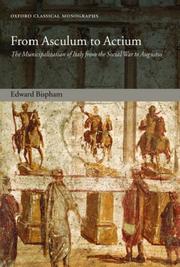
ISBN: 9780199231843 0199231842 0191716197 9786611150389 0191528293 128115038X 143562209X Year: 2007 Publisher: Oxford Oxford university press
Abstract | Keywords | Export | Availability | Bookmark
 Loading...
Loading...Choose an application
- Reference Manager
- EndNote
- RefWorks (Direct export to RefWorks)
Acculturation --- Cities and towns --- Italic peoples --- Municipal government --- Cultural assimilation. --- Rome --- Social conditions. --- History --- Italiotes --- Cities and towns, Ancient --- Culture contact --- Development education --- Civilization --- Culture --- Ethnology --- Assimilation (Sociology) --- Cultural fusion --- Cultural assimilation --- Villes --- Administration municipale --- Conditions sociales --- Histoire --- Culture contact (Acculturation) --- Municipes (droit romain) --- Italiques --- Administration communale --- Romanisation --- Italie
Book
ISBN: 1905670141 9781905670147 Year: 2007 Volume: 100 Publisher: London: Institute of classical studies,
Abstract | Keywords | Export | Availability | Bookmark
 Loading...
Loading...Choose an application
- Reference Manager
- EndNote
- RefWorks (Direct export to RefWorks)
Pliny, --- Congresses. --- Rome --- History --- Histoire --- Congrès --- Rome - History - Flavians, 69-96 - Congresses
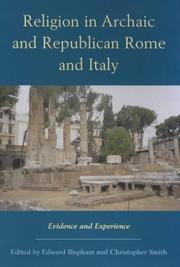
ISBN: 0748614311 9780748614318 Year: 2000 Publisher: Edinburgh Edinburgh university press
Abstract | Keywords | Export | Availability | Bookmark
 Loading...
Loading...Choose an application
- Reference Manager
- EndNote
- RefWorks (Direct export to RefWorks)
Religion --- History --- 292.07 --- Religion Classical Roman --- Religion - Rome - History
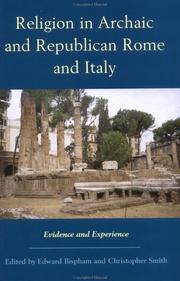
ISBN: 9781579583255 1579583253 Year: 2000 Publisher: Edimbourg: Fitzroy Dearborn,
Abstract | Keywords | Export | Availability | Bookmark
 Loading...
Loading...Choose an application
- Reference Manager
- EndNote
- RefWorks (Direct export to RefWorks)
Rome ancienne --- Religion --- Italie --- Rome
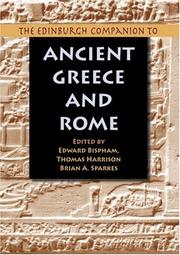
ISBN: 9780748616299 0748616292 0748616306 0748627146 1282136321 9786612136320 Year: 2006 Publisher: Edinburgh Edinburgh University Press
Abstract | Keywords | Export | Availability | Bookmark
 Loading...
Loading...Choose an application
- Reference Manager
- EndNote
- RefWorks (Direct export to RefWorks)
The Edinburgh Companion is a gateway to the fascinating worlds of ancient Greece and Rome. Wide-ranging in its approach, it demonstrates the multifaceted nature of classical civilization and enables readers to gain guidance in drawing together the perspectives and methods of different disciplines, from philosophy to history, from poetry to archaeology, from art history to numismatics, and many more. Key features: written by experts in the field; contains basic and essential information clearly and concisely presented; gives an up-to-date overview of the classical world; guides readers to sources of current reference and further reading material; over 100 illustrations, maps and plans.
History of ancient Greece --- Roman history --- Civilization, Classical. --- Civilization, Ancient. --- Rome --- Greece --- History.
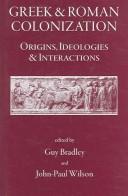
ISBN: 1905125062 9781905125067 Year: 2006 Publisher: Swansea: Classical press of Wales,
Abstract | Keywords | Export | Availability | Bookmark
 Loading...
Loading...Choose an application
- Reference Manager
- EndNote
- RefWorks (Direct export to RefWorks)
Colonization --- History --- Rome --- Greece --- Colonies --- Kolonisatie. --- Griekse oudheid. --- Romeinse oudheid. --- Kolonie. --- Colonies. --- Colonization. --- History. --- Middellandse-Zeegebied. --- Römisches Reich. --- Griechenland (Altertum) --- Greece. --- Rome (Empire). --- Griechenland (Altertum). --- Colonization - History --- Rome - Colonies --- Greece - Colonies
Book
ISBN: 9789004543034 9004543031 Year: 2023 Publisher: Leiden; Boston: Brill,
Abstract | Keywords | Export | Availability | Bookmark
 Loading...
Loading...Choose an application
- Reference Manager
- EndNote
- RefWorks (Direct export to RefWorks)
Violence, Justice, and Law in Classical Antiquity collects together forty-three of Andrew Lintott's most significant papers. Lintott's corpus of work exposes the fundamental reliance of ancient Romans (and Greeks) on violent measures, including their readiness to resort to violence in the manner of judicial "self-help" or political tyrannicide. The legitimation of violence in Roman culture and Roman political discourse informs the nature of Roman imperialism, and equally it is impossible to understand the illegitimate violence which characterised the political collapse of the Roman Republic without understanding its deep roots in the intellectually legitimised and legally sanctioned violence of Roman societ-
Violence --- Roman law. --- Violence. --- Rome --- History --- Politics and government.
Book
ISBN: 9789004543027 Year: 2024 Publisher: Leiden ; Boston : Brill,
Abstract | Keywords | Export | Availability | Bookmark
 Loading...
Loading...Choose an application
- Reference Manager
- EndNote
- RefWorks (Direct export to RefWorks)
"Violence, Justice, and Law in Classical Antiquity collects together forty-three of Andrew Lintott's most significant papers. Lintott's corpus of work exposes the fundamental reliance of ancient Romans (and Greeks) on violent measures, including their readiness to resort to violence in the manner of judicial "self-help" or political tyrannicide. The legitimation of violence in Roman culture and Roman political discourse informs the nature of Roman imperialism, and equally it is impossible to understand the illegitimate violence which characterised the political collapse of the Roman Republic without understanding its deep roots in the intellectually legitimised and legally sanctioned violence of Roman society"--
Violence --- Roman law. --- Rome --- History. --- Politics and government. --- History --- Droit romain --- Histoire --- Politique et gouvernement
| Listing 1 - 10 of 13 | << page >> |
Sort by
|

 Search
Search Feedback
Feedback About UniCat
About UniCat  Help
Help News
News